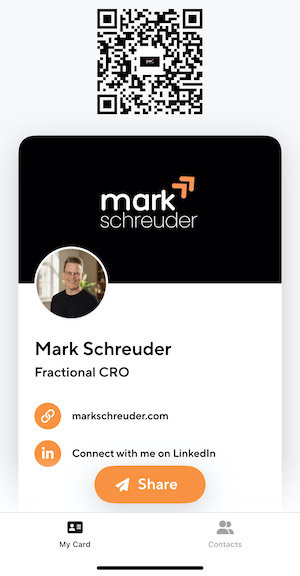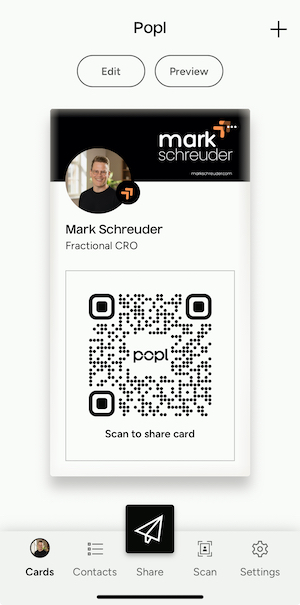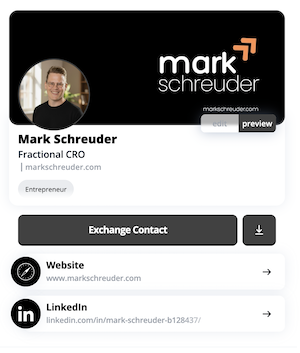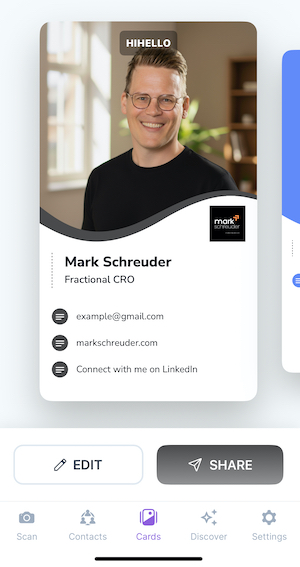
Written by:
Last updated:
Mark Schreuder
November 13, 2025
I tested 10 major digital business card platforms over 6 months at real conferences, networking events, and business meetings to find the best digital business cards for 2025. As former Head of Growth at Blinq - where I analyzed over 2 million card exchanges - I know exactly what separates platforms that work flawlessly from ones that'll fail you at crucial moments. I evaluated each on the metrics that actually matter: reliability, seamless two-way exchange, ease of use, and real-world performance under pressure.
Short on time? Here are my top 3 picks for the best digital business cards:

Excellent two-way sharing
Fast and reliable
Clean interface

AI-powered lead enrichment
Universal card scanner
Polished card design
.png)
Best NFC tap technology
Wide variety of products
High-quality finishing
Digital business cards have replaced paper for millions of professionals worldwide. Instead of handing someone a physical card, you can instantly share your contact information via QR code, NFC tap, or link, directly to their phone, in seconds. No more lost cards, no outdated information, and no running out at crucial moments. Learn more about how digital business cards work.
But here's what most reviews won't tell you: not all digital business cards work equally well.
I'll never forget the conference where I watched someone's digital business card fail three times in a row. Their app froze. The QR code wouldn't load. By the third attempt, the awkward silence was deafening, and they sheepishly pulled out a paper business card from their wallet.
That moment crystallized something I'd learned during my time at Blinq: a digital business card is only as good as its worst moment. You can have unlimited customization, beautiful templates, and advanced analytics, but if your card doesn't work seamlessly when it matters, none of that means anything.
As former Head of Growth at Blinq (part of the executive leadership team overseeing marketing, sales, customer success, and support), and personally testing every major platform at real networking events, conferences, and business meetings, I've learned what separates reliable, seamless platforms that provide a great first impression from ones that'll embarrass you.
Here's my honest, hands-on review of the 10 best digital business cards for individuals in 2025. Ranked not by marketing hype, but by actual real-world performance.
Full Disclosure: I only recommend platforms I've personally tested. Having worked at Blinq, I'm particularly familiar with their platform; however, I've made every effort to evaluate all options objectively, based on real-world testing.
I tested each platform over a 6-month period (May-November 2025) in real-world networking scenarios, not just demos or feature comparisons.
Real-World Scenarios:
What I Evaluated:
Why Two-Way Exchange Matters:
When you share your digital business card, you're only halfway done. The real goal is mutual exchange; they save your info, you save theirs. Most likely in scenarios where you have a digital business card app and the recipient might have paper business cards or a different digital app. During my time at Blinq, our analysis of over 2 million card exchanges revealed that when two-way exchange works smoothly, the user experience and follow-up rates increase significantly.
I tested this for every single platform. This is the evaluation criterion that sets my reviews apart from every other list out there, which tend to focus solely on features.

Overall Rating: 4.5/5
Blinq has one mission: make digital business cards that work flawlessly every single time. No feature bloat. No gimmicks. Just reliable, fast contact sharing that never fails when you need it.

Ratings Breakdown:
Pricing: Free (2 cards), Premium ($7.33/mo), Business ($4.99/user/mo)
Pros:
Cons:
My Take:
While Blinq's business platform has gaps compared to competitors (see my teams comparison for details), the individual app experience is exceptional. Blinq nails what matters most: reliability and seamless two-way exchange. After testing it alongside every competitor, the difference is noticeable. The app opens instantly, the QR code loads in under a second, and recipients never look confused about how to share their info back. It just works.
Yes, I worked here, so factor that in. But after testing all platforms side by side at real conferences and networking events, I still use Blinq for my own professional networking. It's faster, more reliable, and the recipient experience is simply better than anything else I've tested.
The free plan is excellent for most individual professionals. The lack of a card scanner and analytics are the main limitations, but if those aren't deal-breakers, Blinq delivers exactly what you need without compromise.
Overall Rating: 4.25/5
Popl has evolved from being an NFC card-focused platform into a comprehensive digital business card platform powered by AI. If you're managing a sales team, attending trade shows, or need serious lead capture capabilities, Popl is built for you.

Ratings Breakdown:
Pricing: Free (1 card), Pro ($9.99/mo), Pro+ ($14.99/mo), Teams (from $6.99/user/mo)
Pros:
Cons:
My Take:
Popl is purpose-built for teams and enterprises that need lead capture, enrichment, and CRM integration. If you regularly attend trade shows or manage a sales team, the AI enrichment and badge scanning features genuinely save time and justify the investment.
The two-way exchange is optimized for lead capture rather than mutual networking. Fine for teams where contacts flow into your CRM, but worth noting if you're an individual professional expecting Blinq-level smoothness in both directions.
For teams, Popl's comprehensive feature set, centralized dashboard, and CRM integrations make it the best platform for enterprise lead generation. The ROI for companies attending events regularly is clear.If you're evaluating options for your entire organization, check out my detailed comparison of digital business cards for teams.
Overall Rating: 4.0/5
Dot Cards is the leader in NFC business cards, offering the broadest range of hardware options and the most reliable tap-to-share experience. If you want a physical card that feels premium and works consistently, Dot nails it.

Ratings Breakdown:
Pricing: NFC Cards ($15-40 one-time), Free Profile (forever), Premium ($2.99/mo or $29.99/yr), Teams (custom)
Pros:
Cons:
My Take:
Dot Cards found the sweet spot between physical and digital. The hardware quality and NFC reliability are genuinely best-in-class. If you're committed to NFC and want the most reliable tap experience, Dot is your winner.
The one-time purchase model is consumer-friendly. You're not locked into a subscription just to use what you bought. However, if you forget the card at home, you can't share your info (unlike app-first solutions like Blinq).
For professionals who prefer the tactile experience of handing over a physical card combined with digital functionality, Dot delivers the most reliable NFC experience available.
Overall Rating: 4/5
HiHello offers a strong free plan with one standout feature: a built-in business card scanner. If you regularly receive paper cards and need to digitize them, HiHello is the best free solution available.

Ratings Breakdown:
Pricing: Free (4 cards), Pro ($6/mo), Business ($5/user/mo for 5+ users)
Pros:
Cons:
My Take:
HiHello is perfect for professionals who regularly receive paper business cards and need a free scanning solution. If that describes you, the scanner feature alone justifies choosing HiHello, despite some trade-offs in the smoothness of the two-way exchange.
The two-way exchange requires an extra step or two that can sometimes confuse recipients. However, if you prioritize features over pure speed, especially the card scanner, HiHello delivers solid value on the free tier.
Overall Rating: 4/5
Mobilo combines premium NFC hardware with powerful lead tracking software. If you're in sales and need to track, nurture, and convert the contacts you meet, Mobilo's lead management features are purpose-built for you.
Ratings Breakdown:
Pricing: NFC Cards ($10-60 one-time), Free (basic after card purchase), Pro ($4.99/mo), Teams (from $4/user/mo)
Pros:
Cons:
My Take:
Mobilo is perfect for sales professionals, business development reps, real estate agents, and financial advisors whose job is meeting people and converting them into clients. The lead pipeline and automatic follow-ups address the real challenge: follow-up and conversion, not just contact exchange.
The requirement to purchase an NFC card upfront is unusual as most competitors let you try the app first. However, if you're committed to NFC and want premium materials, the metal cards genuinely make an impression.
For individual users focused on general networking rather than lead generation, Blinq or HiHello offer better experiences. But for sales teams, Mobilo's comprehensive lead management justifies the investment.
Overall Rating: 4/5
V1CE positions itself as the luxury option in digital business cards, offering premium materials like bamboo, metal, and even 24K gold-plated cards. If making a memorable physical impression matters to your brand, V1CE delivers on quality.
Ratings Breakdown:
Pros:
Cons:
My Take:
V1CE succeeds at what it promises: premium, memorable cards that elevate your physical presence. The bamboo and metal options genuinely feel special in a way that plastic cards don't. If your clients expect premium everything, V1CE matches that expectation.
The lack of a mobile app is a significant drawback for practical daily use. You manage your profile through a web browser, which means accessing your QR code requires pulling up a saved image or website, which is less convenient than using app-based competitors.
Think of V1CE as the "luxury car" of digital business cards. Impressive, but you're paying for more than just functionality. For executives and luxury brand representatives where impression matters, V1CE is worthy. For functional efficiency, app-based platforms offer better everyday usability.
Overall Rating: 3.5/5
Note: Linq is strategically shifting from purely digital business cards toward becoming a broader communication and messaging platform. While they still offer excellent business card functionality, their focus is expanding beyond simply sharing contacts.
Ratings Breakdown:
Pricing: Free App (with product purchase), NFC Products ($12-50+), Pro ($9.99/mo), Teams (custom)
Pros:
Cons:
My Take:
Linq is at an interesting crossroads, building toward something bigger than just digital business cards. This could be visionary or could dilute their focus. Time will tell.
For now, they still offer solid business card functionality with good team features. The creative NFC products (especially Apple Watch bands) are cool. However, if you're choosing based purely on business card performance, Dot Cards edges them out in terms of NFC reliability, and Blinq/HiHello are stronger for app-first solutions.
Linq works for professionals or teams who want flexibility and are interested in a platform that does more than just business cards.
Overall Rating: 3.5/5
Tapt offers straightforward NFC business cards at accessible price points with transparent one-time pricing. If you want to try NFC without breaking the bank, Tapt provides a solid entry point.
Ratings Breakdown:
Pricing: Standard Card ($15-25), Premium Card ($35-45), Pro ($6.99/mo), Teams ($4.99/user/mo for 5+ users)
Pros:
Cons:
My Take:
Tapt is the "economy class" of NFC business cards. It gets you where you need to go at the lowest price, but with trade-offs in reliability and polish.
The price point is attractive for experimenting with NFC. However, the lower NFC reliability (70-75% vs. 90% for Dot Cards) means you'll have more moments when taps fail. If reliability and professional impression are critical to your brand, spending $10-20 more for Dot Cards or opting for an app-first approach with Blinq makes more sense.
Tapt works for budget-conscious professionals, students, early-career individuals, or side hustles where investment must be minimal.
Overall Rating: 3.5/5
Wave Connect is the newcomer that has caught attention with its genuinely beautiful design and sleek user experience. Based in Canada, they're quickly gaining traction for their modern aesthetic and thoughtful features.
Ratings Breakdown:
Pricing: Free (basic), Pro ($6.99/mo), Teams ($5.99/user/mo for 5+ users), NFC Cards ($20-45)
Pros:
Cons:
My Take:
Wave proves that design matters in digital business cards. While features and reliability are crucial, aesthetic experience influences how people perceive you professionally. Wave gets this right.
The platform is still maturing. It doesn't have the enterprise depth of Popl or the battle-tested reliability of Blinq, but for individual professionals who want something beautiful, it's an excellent choice.
If you care about making a "wow" impression with design and want your digital business card to reflect your aesthetic sensibilities, Wave delivers. For pure functionality and speed, Blinq remains the winner, but Wave offers the best-looking experience on the market.\
Overall Rating: 3.5/5
Uniqode is first and foremost a QR code company that offers digital business cards as one application of its technology. If QR code flexibility is your priority, then Uniqode delivers, but if you just want a simple digital business card, you're paying for more platform than you need.
Ratings Breakdown:
Pricing: Starter ($5/mo), Lite ($14/mo), Pro (custom), Enterprise (custom)
Pros:
Cons:
My Take:
Uniqode is a QR code platform first, digital business card platform second. That focus makes it powerful for specific use cases but less convenient for everyday networking.
For enterprises that need strict control over employee business cards with enterprise-grade security (SOC 2, GDPR, SSO), Uniqode's admin dashboard and approval workflows provide exactly what's needed. For regulated industries like finance, healthcare, or legal, the compliance features justify the premium.
For individual professionals just wanting a reliable digital business card, the lack of a mobile app and the complexity make it hard to recommend.
Check out my complete guide: What Are Digital Business Cards for everything you need to know about how they work, key features, and real-world use cases.
If you're evaluating options for your entire team, see my guide: Best Digital Business Cards for Teams.
Which digital business card is completely free?
HiHello offers the most generous free plan, which includes four cards and five business card scans per month, all without any payment required. Blinq's free plan is also excellent, with two cards, custom colors, and multiple layouts. Tapt and Linq offer basic free features with NFC card purchase. Most platforms offer free tiers, but HiHello provides the most value without requiring a credit card.
Do I need to buy an NFC card?
No. Platforms like Blinq, HiHello, Popl, and others work perfectly with just QR codes and links. No hardware required. NFC cards are optional accessories. I'd recommend starting by only buying an NFC card if you find yourself missing the physical exchange. If you do want NFC, Dot Cards offers the most reliable tap experience ($15-40), V1CE provides luxury materials ($35-120), and Tapt is the budget option ($15-25).
Which platform has the best NFC card?
Dot Cards features the most reliable NFC tap technology (with a 90% success rate in my testing) at reasonable prices. V1CE offers the most premium materials (bamboo, metal, and 24K gold) if a luxury impression is important to your brand. Tapt is the budget-friendly option if you want to test NFC at a low cost. Mobilo's metal cards also feel premium and pair well with their lead generation features.
Which platform has the best two-way exchange?
Blinq has the smoothest two-way exchange in my testing. Recipients can share back instantly without downloading an app or creating an account. HiHello, Popl, Mobilo, and Dot Cards also handle this reasonably well. V1CE, Tapt, and Uniqode require more steps and feel less polished.
Can I switch platforms later?
Yes, though you'll need to update any instances where you've shared your old card link (email signatures, social media, website). Your contacts won't automatically transfer between platforms. Most platforms let you export your contacts as CSV files for easy migration.
Which is best for teams?
Popl is the clear winner for teams and enterprises, with centralized dashboards, AI lead enrichment, and robust admin controls. Mobilo is also particularly strong for sales teams.
Do these work internationally?
Yes, all platforms work globally. Check pricing in your local currency, as some platforms charge in USD while others localize pricing.
Which platform is most reliable at events with bad WiFi?
Blinq and Popl both cache your card data locally, so they work even with spotty or no connectivity. Popl is specifically designed for this with its offline mode, which syncs later.
I served as Head of Growth at Blinq (part of the executive leadership team overseeing marketing, sales, customer success, and support), where I analyzed data from over 2 million card exchanges and worked directly with enterprise customers implementing digital business cards at scale. This article is based on real-world testing at conferences, networking events, and business meetings across 6 months in 2024-2025.